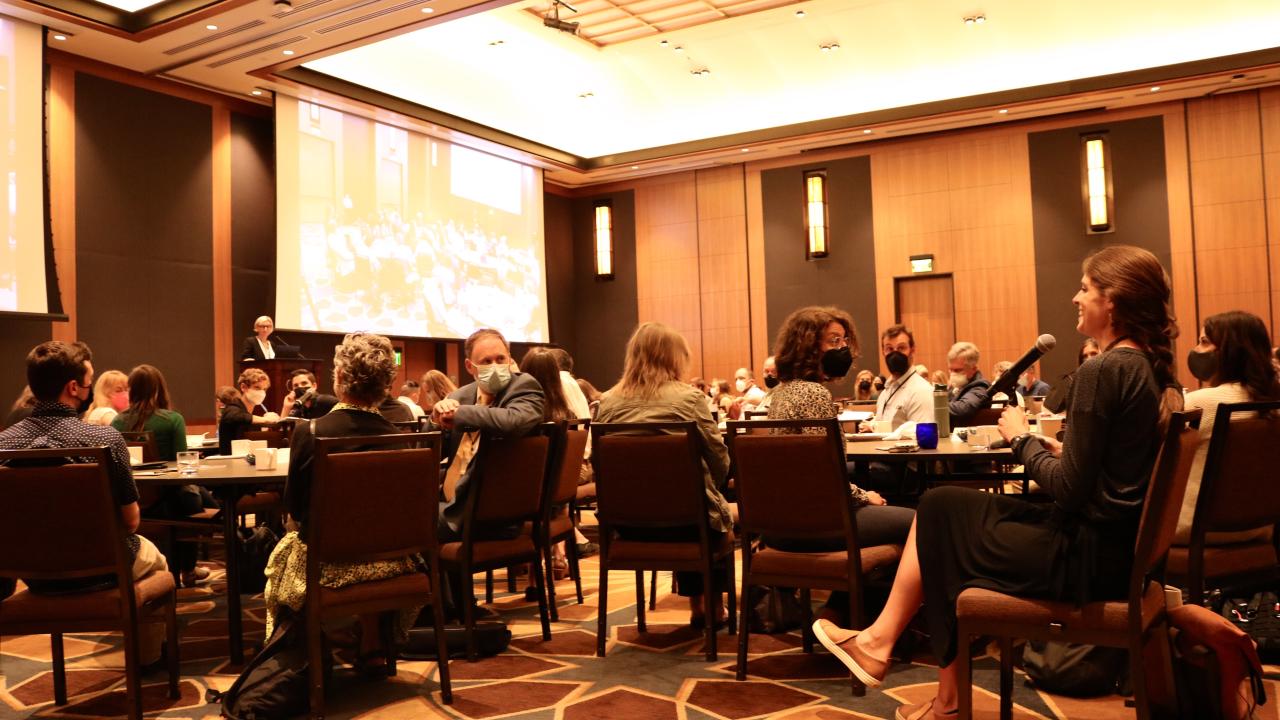UCLA hosted the Climate & Wildfire Institute's inaugural convening workshop on June 27 and 28, where more than 100 stakeholders met in person and virtually to help set the agenda for the institute now and into the future.
In the fall of 2020, much of California and the Western U.S. was dealing with, or had already dealt with, the dire effects of a record fire season. The urgency to act and to act quickly had never been greater. Experts in the disparate fields relating to climate change and wildfire research saw an opening.
The normalization of video calls allowed those experts to connect on a regular basis and more widely than ever before. What began as video chats over lunch involving experts from areas across the spectrum of climate change and wildfire, would ultimately lead to the formation of the Climate & Wildfire Institute — an organization with the purpose of working across academia, the private sector and government to create a faster and more nimble response to the most pressing wildfire and climate change issues facing the state of California and beyond.
“These catastrophic and horrific fires have become the norm,” said Ken Alex, CWI board president and director of Project Climate at UC Berkeley. “And we know we can’t allow this to continue.”
CWI members were emboldened by the successes seen through the health community rallying together for the greater good to combat COVID-19, and what could be accomplished — and accomplished quickly — when experts and leaders in the field broke down barriers and fostered greater collaboration and coordination. This effort by the CWI will strive to put the best science in front of policy and decisionmakers faster, while addressing any gaps in knowledge and understanding that would need to be better identified and prioritized.
“We were very motivated by the fact that there is all this amazing research going on, and all this amazing scientific talent that is investigating the wildfire question,” said Alex Hall, CWI board secretary and professor of atmospheric and oceanic sciences at UCLA. “But it’s not coordinated and properly leveraged, and it’s not necessarily doing work that is the most relevant to the people who actually cope with wildfires — communities, decisionmakers, agencies and so on.
The CWI’s holistic approach will coordinate advances in research, policy and implementation to confront the public health, social and environmental impacts of the warming climate and its worsening fire regime. It will bring together leading researchers, policymakers, civil society, Indigenous communities and the private sector to speed the research-to-solution pathway and serve as a clearinghouse for critical datasets. It will also serve as a hub for policy solutions and technology transfer, while acting as a coordinating platform to refine and align research. Finally, the CWI will provide training, convene experts, and improve coordination among scientific discovery, technology, innovation strategies and policy.
In its current form, the CWI is governed by an eight-member founding board that represents researchers and stakeholders from across California. Its stakeholders are experts in environmental science, wildfire dynamics, wildfire spread, ecology, air quality modeling, public health, land use, insurance impacts, vegetation management, fuel treatment, public policy and wildland management — just to name a small sampling.
In January 2022, the CWI received initial funding from the State of California — $7 million over three years — which will enable it to begin to fulfill its mission to advance understanding, apply the latest research and build capacity to confront the wildfire and climate crisis.
The inaugural convening was the first major meeting of stakeholders to help set the agenda for the CWI now and into the future, forging solutions and a way forward.
“We think it is very important to listen,” Alex Hall said. “We don’t see our mandate to decide what needs to be done and then do it — it’s about first listening to what people need and helping this community come to decisions on what to prioritize. There are so many stakeholders involved with different perspectives, and we want to take all of those into account and prioritize them in a holistic way.”
In June, the CWI hired its first executive director, Caroline Godkin, who brings more than a decade of experience in environmental and emergency response policymaking in California including CAL FIRE, CalEPA and the California Natural Resources Agency.
“The climate emergency is real, and it is here, and it is impacting every single one of us every day,” Godkin said. “I am excited to join the CWI, as to me it represents hope in the face of an ongoing catastrophe. To preserve our precious landscapes for future generations we must work across all disciplines to bring the best available science to bear on this issue. I look forward to working with all of the talented academics, practitioners, policymakers and government representatives to fully release the potential of the CWI to support meaningful solutions to the wildfire crisis.”
While initially focused in California and Nevada, the aim of the institute is to create solutions for the entire Western U.S., as megafires with similar dynamics have been emerging throughout the region.
“Right now, I think there is a legitimate fear and concern that this is the new normal — that we’re going to have massive fires and massive air pollution,” Ken Alex said. “Our perspective is, while fire will be a part of the landscape going forward, it doesn’t have to be catastrophic. There are solutions to this. There are ways to handle wildfire in relationship to the changing climate that communities in fire prone areas can benefit from.”
Image Source: UCLA/Jonathan Van Dyke





